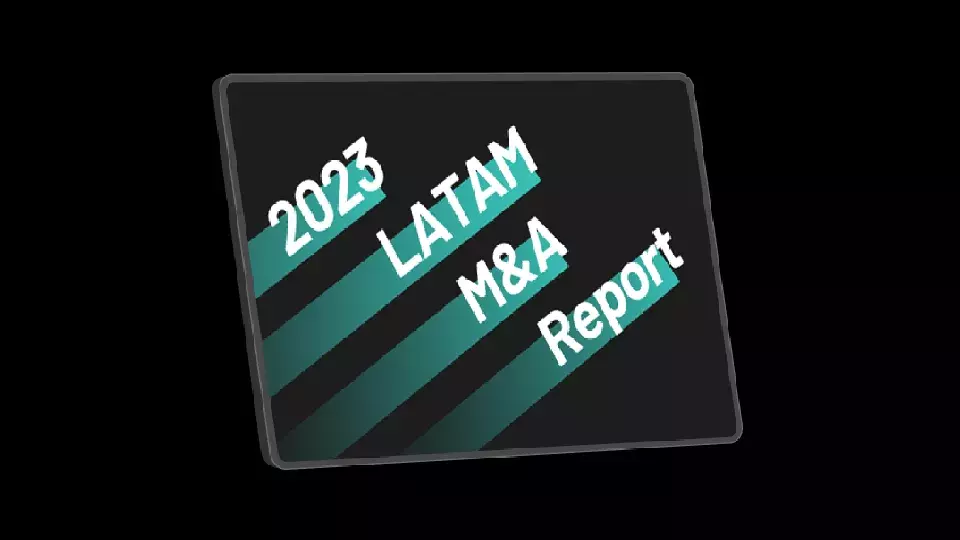Biggest M&A Trends in Latin America for 2023
In this episode, we’re discussing M&A trends in Latin America with Ana Toral, a correspondent for Chile and Ecuador at Mergermarket.
Ana tells us, “The rising cost of capital combined with recession fears, inflation woes and regional political uncertainty has led dealmakers to become more cautious and prioritize investments in companies that have sought to increase their profitability, a trend that is likely to remain in place in 2023 in Latin America.”
Listen to learn more about:
- Why private equity firms are postponing exit plans
- Sectors in Latin America impacted by digital transformation
- Brazil’s competitive advantage
- M&A deal activity drawing investor attention in Chile and Mexico
Dealcast is presented by Mergermarket and SS&C Intralinks.
Transcript
[MUSIC PLAYING] JULIE-ANNA NEEDHAM: Hello and welcome to Dealcast, the weekly M&A podcast presented to you by Mergermarket and SS&C Intralinks. I'm Julie-Anna Needham. I'm a business journalist who's been covering M&A for a decade. In this episode, we're finding out about M&A trends in Latin America. Joining me is Ana Toral, a correspondent for Chile and Ecuador.
Hi, Ana. Thanks very much for joining me today.
ANA TORAL: Hi, Juliana. Thank you for having me, a pleasure to be here.
JULIE-ANNA NEEDHAM: Great. So to begin with, can you give us the overall picture for M&A activity during last year, 2022, in Latin America, please?
ANA TORAL: Sure, wonderful. Well, Latin America M&A activity reports slight growth in terms of numbers of deals in 2022 with around-- I'm going around numbers-- 1,400 transactions last year compared with 1,300 transactions in 2021. In terms of deal value, in contrast, dropped from $149 billion in 2021 to $92 billion this year, all according to Dealogic data.
So there are several other things that we have to take in consideration. For example, the rising cost of capital combined with recession fears, inflation woes, and regional political uncertainties have led deal makers to become more cautious and prioritize investments in companies that have sought to increase their profitability, a trend that is likely to remain in place in 2023 in Latin America.
Also, the wait-and-see stance had an impact on the number of sponsors exits as many private equity firms are looking to postpone their exit plans. So sponsor exits were down 20 deals last year from 24 deals in 2021. Brazil, the biggest economy in the region, for example, did not report a single IPO in 2022.
JULIE-ANNA NEEDHAM: Thank you. And you mentioned Brazil there. Can you run through the main deal-making countries in the region and some of the key highlights that have happened in those countries, please?
ANA TORAL: Among the biggest markets, the deal activity was higher in Brazil, 70%. In Chile, 47%. In Colombia, 84%. On the other hand, we saw countries declining its deal flow as Mexico, Argentina, and Ecuador.
JULIE-ANNA NEEDHAM: So Ana, you've mentioned Brazil a couple of times. And it's obviously the biggest market in Latin America. But there have been lots of political changes going on there. Can you run through those and explain how those things are impacting M&A, how they affected M&A last year and how they're likely to affect it this year, please?
ANA TORAL: Sure. Brazil just had a polarized election in recent years, which was held in October led by Luiz Inacio Lula da Silva. And he got back to the office with a third term as a president. And these also contributed to a slowdown in Brazil deal activity in the second half of the year. It was expected. And although 2023 had, obviously, a slowdown in deal activity, Brazil continues to be Latin America's most important M&A market due to very factors, several factors.
For example, its diversified economy, its strong financial system, good rates of return, large consumer market, and solid business opportunities. So it will continue to be a nice spot or country to invest. And we can expect some deals by 2023. For example, sectors that were impacted by digital transformation include financial services, everything related with agribusiness, education, logistics, health care also, renewable energy, media and everything related with telecommunications should continue to draw investors' attentions for M&A deals.
Another thing that we have to take into consideration is what's going on in the world economy as the slowdown of China generates also good M&A opportunities for Brazil and other emerging markets in Latin America and will do in 2023. Because investors gradually seek other places to allocate their investments mainly. And Latin America has become a nice spot for it.
Also, Brazil has a competitive advantage in terms of attracting everything related with PEs, private equities, venture capital, investments. Why? Because the size of the market and many Latin American countries still have smaller markets and lack liquidity options, which forces financial investors to write smaller checks. And there are investors that have a range of capital that we like to allocate or larger sums of capital that would be possible in Brazil.
JULIE-ANNA NEEDHAM: Thank you. And turning away from Brazil and looking to the North of the region now, can you tell us about M&A in Mexico during 2022? And which were the hot sectors? And which will be the hot sectors during 2023?
ANA TORAL: Sure. Middle market M&A activity reigns in Mexico with most deals ranging between USD 30 million and USD 200 million. They intensified trade competition between US and China, along with high freight rates have created M&A opportunities for Mexico's supply chain sectors as companies. And countries seek to reduce their manufacturing dependence on the Asian country.
Other hot sectors that are likely to continue drawing tension from strategic and financial investors include health care, technology services, real estate, and e-commerce. For example, the sectors that saw the least amount of M&A activity in 2022 were energy, oil and gas, and telcos, many due to policy uncertainty.
Well, it's not that there are not sectors that are interest for investors. Bad policies have to set the road to have more of a stability when an investor wants to enter those sectors. So one of the main sectors to look at will be everything related with e-commerce aggregators. Everything related with e-commerce will be a nice sector to invest because it is expected to grow in 2023.
JULIE-ANNA NEEDHAM: And finally, Ana, looking at Chile, one of the most southern parts of the region, can you tell us about what's drawing investors' attention there, and some examples of some of the deal activity going on, please?
ANA TORAL: Sure. Tech and mining are in the spotlight. Technology is likely to continue drawing investor attention as well as the mining industry during 2023. The mining industry is expected to attract investments worth about USD 69 billion up to 2030 in Chile. Why? Because Chile owns 48 percent of the world's lithium reserves, which are used to produce rechargeable batteries for cars, for electric cars, mainly, and 22 percent of the global copper reserves.
It's also the country that holds important reserves of molybdenum, which is used in airplanes, gold, and silver. Other key sectors for deal activity include infrastructure, renewable energy, waste treatment, telecoms, and biotech.
JULIE-ANNA NEEDHAM: And can you run through some of the big deals? Can we have some examples of what's going on in Chile, please?
ANA TORAL: Sure. For example, there was an important telecommunications investment. There was the purchase of 3,800 telecommunications sites by Phoenix Tower International, which is based in the U.S. from the telecommunications block or telecommunications operation 1. This deal was for about USD 930 million in July 2022.
Another transaction to capture investor interest in the local energy and infrastructure space was the sale in March by Canadian asset manager OMERS and Spanish gas network Enagas of a combined 80% stake in LNG terminal, Quintero, to a consortium led form by one PE firm in DC and Belgium-based natural gas transmission system operator. That was another strong one with a good example of what happened in the local energy and infrastructure space.
JULIE-ANNA NEEDHAM: Right. Ana, thanks very much. That was Ana Toral correspondent for Chile and Ecuador. Thanks for listening to this week's episode of Dealcast presented by Mergermarket an SS&C Intralinks. Please rate, review, and follow the podcast. You can find us on Apple Podcasts, Spotify, or look out for your Mergermarket news alert. For more information, have a look at our show notes. Join us next week for another episode.
[MUSIC PLAYING]




